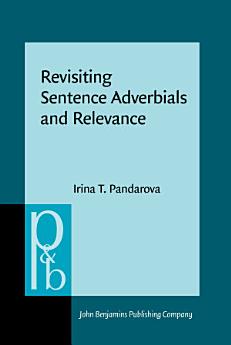Revisiting Sentence Adverbials and Relevance
Irina T. Pandarova
জুন ২০২৩ · Pragmatics & Beyond New Series কিতাপ 334 · John Benjamins Publishing Company
ইবুক
254
পৃষ্ঠা
reportমূল্যাংকন আৰু পৰ্যালোচনা সত্যাপন কৰা হোৱা নাই অধিক জানক
এই ইবুকখনৰ বিষয়ে
This book offers a fresh take on several long-standing issues relating to the (non-)truth-conditional interpretation of epistemic, evidential, hearsay and attitudinal sentence adverbials. Drawing on a wealth of data from English and German, it shows for the first time that all four adverbial classes can have both truth-conditional and non-truth-conditional (parenthetical) readings. A novel account is presented according to which (non-)truth-conditional readings may arise at either the syntactic or the pragmatic level. Couched in relevance theory, the book also re-examines the explicature and illocutionary status of the adverbial qualification and the qualified proposition, and refines the notions of pointhood and at-issueness to provide an original information-structural analysis applicable to not just sentence adverbials but a range of other propositional qualifiers. Finally, the investigation identifies five factors affecting (non-)truth-conditional interpretation: linear position, prosody, the semantics of the adverbial, its information-structural properties and the wider context. The book will be of interest to those interested in relevance theory, the semantics/pragmatics interface, the syntax/pragmatics interface and information structure, as well as for syntacticians, semanticists and pragmatists interested in sentence adverbials, other propositional qualifiers and parentheticality, syntactic and interpretational.
এই ইবুকখনক মূল্যাংকন কৰক
আমাক আপোনাৰ মতামত জনাওক।
পঢ়াৰ নির্দেশাৱলী
স্মাৰ্টফ’ন আৰু টেবলেট
Android আৰু iPad/iPhoneৰ বাবে Google Play Books এপটো ইনষ্টল কৰক। ই স্বয়ংক্রিয়ভাৱে আপোনাৰ একাউণ্টৰ সৈতে ছিংক হয় আৰু আপুনি য'তে নাথাকক ত'তেই কোনো অডিঅ'বুক অনলাইন বা অফলাইনত শুনিবলৈ সুবিধা দিয়ে।
লেপটপ আৰু কম্পিউটাৰ
আপুনি কম্পিউটাৰৰ ৱেব ব্রাউজাৰ ব্যৱহাৰ কৰি Google Playত কিনা অডিঅ'বুকসমূহ শুনিব পাৰে।
ই-ৰীডাৰ আৰু অন্য ডিভাইচ
Kobo eReadersৰ দৰে ই-চিয়াঁহীৰ ডিভাইচসমূহত পঢ়িবলৈ, আপুনি এটা ফাইল ডাউনল’ড কৰি সেইটো আপোনাৰ ডিভাইচলৈ স্থানান্তৰণ কৰিব লাগিব। সমৰ্থিত ই-ৰিডাৰলৈ ফাইলটো কেনেকৈ স্থানান্তৰ কৰিব জানিবলৈ সহায় কেন্দ্ৰত থকা সবিশেষ নিৰ্দেশাৱলী চাওক।







